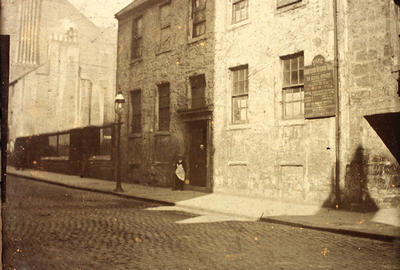
The Free Anderston Mission Hall in Clyde Street, c 1880.
The Anderston Free Church of Scotland was built in 1844, and replaced by a stone building five years later. In 1851 the church opened a mission in Anderston to reach out and provide practical assistance to the poor living in the area.
The Free Church was one of several which operated its own missions in the city. For many evangelical Christians, overcrowding, disease, and unemployment distracted people from worship and from leading "Godly" lives. Evangelists seeking converts among Glasgow's poor encountered some of the worst social conditions in 19th Britain and many organisations were created to tackle problems associated with extreme poverty. Among them were the Glasgow City Mission (founded in 1826), the Glasgow Medical Mission (1867), and the Glasgow United Evangelistic Association (founded in 1874), providing hot meals, medicine, help in finding employment and care for the very young, elderly, sick and disabled. Some were founded to help specific groups, such as the Canal Boatman's Institute and Port Dundas Mission, which was founded in 1871 to provide for the social, moral, and religious welfare of canal boatmen and their families.
Reference: Glasgow University Archive Services, PHU64/45
University of Glasgow
Keywords:
Anderston Free Church, architecture, Canal Boatman's Institute and Port Dundas Mission, charities, charity, Clyde Street Mission, evangelicalism, evangelism, Free Anderson Mission Hall, Glasgow City Mission, Glasgow Medical Mission, Glasgow United Evangelistic Association, missions, slums, social work
You have 0 images in your photo album.